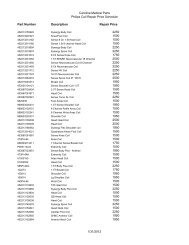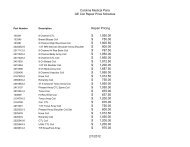I S S U E - DOTmed.com
I S S U E - DOTmed.com
I S S U E - DOTmed.com
You also want an ePaper? Increase the reach of your titles
YUMPU automatically turns print PDFs into web optimized ePapers that Google loves.
Could a Foreign Currency Replace the US<br />
dollar as the World Reserve?<br />
The American dollar could<br />
be replaced as the World<br />
Reserve currency by a <strong>com</strong>bined<br />
currency from Brazil,<br />
Russia, India or China, collectively<br />
as the BRICs. These countries<br />
have large economies and are outgrowing<br />
their emerging-market status. So<br />
will they replace the American dollar,<br />
and if so, when does this happen?<br />
There are four currencies involved<br />
in BRIC - the Chinese Yuan, the Brazilian<br />
Real, the Russian Ruble and the<br />
Indian Rupee. Though these countries<br />
could possibly create a <strong>com</strong>mon currency,<br />
similar to the Euro, this would be<br />
difficult to ac<strong>com</strong>plish. If you doubt this,<br />
try to imagine how an authoritarian Russia<br />
will work with a doctrinarian Communist<br />
China, a Democratic India, and<br />
an unstructured Brazil. The <strong>com</strong>bination<br />
would be hard to see emerging with any<br />
clear Asian-European-Latin American<br />
consensus. Even if the dollar were not replaced<br />
by a BRIC currency, it could still<br />
be swapped out for another currency.<br />
The current advantage to having the<br />
American dollar as the world reserve is<br />
that we have the luxury of borrowing in<br />
our own currency. We can always print<br />
more money, while other countries do<br />
not have the option of influencing the<br />
money supply. But, by having the world<br />
reserve’s currency, our monetary policy<br />
is also <strong>com</strong>promised by other countries<br />
trying to pull the dollar toward their<br />
own currencies.<br />
Overall, BRICs lack the economic<br />
fitness to handle the responsibility of the<br />
world reserve; however, if BRICs start<br />
to talk about replacing the dollar, there<br />
could be a major re-pricing of <strong>com</strong>modities<br />
as investors lose confidence. The<br />
buzz and fear around a possible BRIC<br />
replacement for the dollar has more to<br />
do with a political and economic power<br />
struggle than with getting a stronger<br />
currency as the world reserve. The<br />
BRICs have to threaten the possibility<br />
if they want to be taken more seriously<br />
and seen as real economic powerhouses<br />
on the world’s economic stage.<br />
The BRIC countries will likely pursue<br />
the replacement of the dollar as the<br />
reserve currency. However, this is not<br />
the same as saying they will achieve it.<br />
The likelihood is that they will not. This<br />
is largely because of economic and political<br />
limits to the BRIC countries.<br />
The challenge for BRIC is to reproduce<br />
the once solid stability of the<br />
American dollar and not to emulate the<br />
relatively tarnished Euro. More challenging<br />
is how BRIC will replace the<br />
dollar without debasing the significant<br />
dollar reserves and dollar-denominated<br />
investments of those countries, and<br />
without harming the still delicate U.S.<br />
economy, and without hammering the<br />
many futures markets that are based<br />
upon <strong>com</strong>mon U.S. pricing.<br />
Of the four BRIC currencies, perhaps<br />
China’s Yuan is a logical replacement<br />
for the dollar at some point, since<br />
China has been lending the US money.<br />
China is better placed than the U.S. to<br />
provide a reserve currency for the 21st<br />
century because it has a large current account<br />
surplus, focused government, and<br />
few of the economic worries the U.S.<br />
money<br />
health<br />
By Paul Keough, Ph.D., MBA<br />
faces. While such a major change is<br />
some way off, the Chinese government<br />
is laying the ground for the Yuan’s positioning.<br />
China will soon want to see the<br />
Yuan included in the International Monetary<br />
Fund’s special drawing rights basket,<br />
as well as seeing the Yuan used as a<br />
means of payment in bilateral trade.<br />
China’s currency is a long way<br />
from overtaking the dollar as the world<br />
currency, and even if that occurred,<br />
there likely would be some intermediate<br />
steps. At the present time, China<br />
manages its currency too closely to be<br />
a world currency. The good thing about<br />
China’s currency right now is that its<br />
management techniques keep the currency<br />
undervalued and its purchasing<br />
power much higher than other countries<br />
that are more freely traded. With<br />
China’s Yuan pegged to the dollar, an<br />
emerging conflicted country’s currency<br />
is unlikely to replace America’s monetary<br />
unit anytime soon.<br />
In conclusion, a possible BRICs<br />
takeover of the world reserve is unlikely<br />
to happen soon, if at all, with China’s<br />
Yuan as the most likely single currency<br />
to eventually be<strong>com</strong>e the next world<br />
reserve. At the end of the day, whether<br />
or not people agree with U.S. economic<br />
policy, the dollar is still currently the<br />
best selection for the world reserve on<br />
a relative basis.<br />
Paul Keough, PhD, MBA is the<br />
President at Turnkeough Corporation<br />
(www.turnkeough.<strong>com</strong>). You can reach<br />
him at paul.keough@turnkeough.<strong>com</strong>.<br />
• Online: dotmed.<strong>com</strong>/dm10005<br />
<strong>DOTmed</strong>business news I s e p t e m b e r 2009 35

















